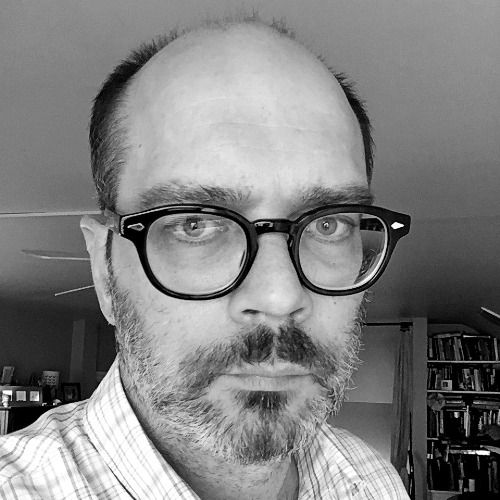Episode 4
Gary Metras and Simon Perchik
Gary Metras is a retired high school English teacher and college writing instructor. His poems have appeared in America, The Common, Poetry, and many others. Metras has published eight books, including his latest called Vanishing Points. His book Marble Dust is forthcoming from Cervena Barva Press. Metras was the founder, editor, and letterpress printer of Adastra Press, a venture that for forty years specialized in limited editions of poetry chapbooks. In 2018, Metras was appointed the inaugural Poet Laureate of Easthampton, Massachusetts.
Simon Perchik's poems have appeared in The Nation, Poetry, The New Yorker, and many others. He was born in 1923 in Paterson, New Jersey. During World War II, he joined the Army Air Corps, flew 35 missions overseas, and reached the rank of first lieutenant. Thanks to the GI Bill, Perchik attended New York University where he earned a bachelor’s degree and a law degree. He practiced law for 25 years before becoming an assistant DA for Suffolk County and its first environmental prosecutor. He was a prolific writer, and he published more than thirty books of poetry. A November 2000 issue of Library Journal called Simon Perchik “the most widely published unknown poet in America.” Perchik died on June 14, 2022, in New York City.
Links:
Read "The Engagement" and "Lint" at The Poetry Foundation
Gary Metras
"Two Poems by Gary Metras" at Flyfishing and Tying Journal
"Art Maker: Gary Metras, Poet" at Daily Hampshire Gazette
"In Studio: Gary Metras" by Easthampton Media (via YouTube)
Simon Perchik
"Simon Perchik, Poet" in The Easthampton Star
"Five Poems" at the Poetry Foundation
"Two Untitled Poems" at The Inflectionist Review
Mentioned in this episode:
KnoxCountyLibrary.org
Thank you for listening and sharing this podcast. Explore life-changing resources and events, sign up for newsletters, follow us on social media, and more through our website, www.knoxcountylibrary.org.
Transcript
Welcome to The Beat, Knox County Public Library’s poetry podcast. Today we’ll hear Gary Metras read his poems, “The Engagement,” “Lint,” and “Another Winter.” Metras will follow with a tribute to the poet Simon Perchik who died in June of last year. Metras will be reading Perchik’s poems “3” and “482” from Perchik’s book The Family of Man Poems.
Gary Metras:
Here’s a poem of mine that celebrates a Ukranian folk custom. Its title is “The Engagement.”
The bride to be sews
a pillow for the marriage bed,
cross stitches a design from Ukraine
so old it’s not in any book,
but shown by grandmothers
to mother, to daughter.
The cloth white
as a winter field near Lviv.
The needle pulls thread, tight:
A red, deep as pain, or love,
works its way through snow;
the green, the brown of earth
live again in young hands;
a thin gold line is the hope
for greedless wealth;
pink is for baby’s cheek;
two blues color sky and dream;
black confines the shapes.
At the pillow’s center
a bird flies.
She locks the bird
in chains of diamonds
far from the flowers along the edge.
Each time the needle enters cloth,
she whispers, do I believe he loves me?
A thousand stitches, a thousand whispers
and in that last knot,
tucked and tufted on the inside
where no one can see,
is the answer.
The second poem is from my newest book Vanishing Points, published in October ‘21 by Dos Madres press in Ohio. It treats a rather mundane subject, but, I hope, in a novel way. The poem is called “Lint.”
It doesn’t bother me to have
lint in the bottoms of pant pockets;
it gives the hands something to do,
especially since I no longer hold
shovel, hod, or hammer
in the daylight hours of labor
and haven’t, in fact, done so
in fifty-five years. A long time
to be picking lint from pockets.
Perhaps even long enough to have
gathered sacks full of lint
that could have been put
to good use, maybe spun into yarn
to knit a sweater for my wife’s
Christmas present, or strong thread
whirled and woven into a tweedy jacket.
Imagine entering my classroom
in a jacket made from lint.
Who would believe it?
Yet there are stranger things—
the son of a bricklayer with hands
so smooth they’re only fit
for picking lint.
This poem is called “Another Winter.”
Old Tom, mountain
beyond the backyard, sleeps
like a titan. For you
this is just another winter.
The snow numbs. The wind chafes.
Dream is your retreat.
The valley you sprang from
has been measured, marked, cut
and built on
as if there's nothing else
for men to do.
When the snow comes
where will those boundaries be?
Your flank was hacked out like a tumor
so we could ski in our health.
An antenna is your crown, blinking
the night long journey we think
will last eternity;
The scrub pine bend under snow.
You hardly flinch in your waiting,
in the deep mystery of your stone.
The land would be barren without
your height, like a boy
with no father, or man without God,
a monotony beyond us all.
When the snow melts, sluicing down
your wind sculpted side,
a few more trees will be cut,
a foundation or two
dug to gape with the emptiness
hopes are built from.
And then new neighbors,
who’ll look at you
in June deliciousness and wonder
what to do with time,
while you attend all the winters
to come.
This is Gary Metras with a tribute to Simon Perchik who died this past year at age 98. Simon was a very prolific poet and a very talented one. I first met Simon Perchik in the early nineteen eighties at the old New York City Small Press Book Fair in midtown Manhattan. I was a new small press poetry publisher, and this was my first year displaying the titles. Si worked his way among the rows of tables of small press publishers. When he approached my table, he read my sign: “Adastra Press, Easthampton, Massachusetts.” He told me he lived in Easthampton, New York. We talked about the chapbooks I had on my table, who the poets were, where the chapbooks were printed, how could such handcrafted works be priced so reasonably. He told me he’d published in a little magazine along with a couple of my poets, and that he’d had a couple of letterpress chapbooks from a New York publisher. I told him I owned an antique printing press and a dozen drawers of metal type (what Johannes Gutenberg called moveable type) that my print shop was in the basement of my house, and that I did all the printing and binding myself. When he told me his name, I said I had a couple of poems in journals that his poetry was also in. From these commonalities, we struck up a friendship, as coincidental as that. I asked if he’d had lunch, and he said, “No.” I said, “Let’s go lunch in the cafeteria.” We did. As simple as that. And we’d lunch every year, during the book fair, for about eighteen years. Our conversations were wide-ranging, sympathetic, and not always about poetry. But we did talk poetry. Our writing habits. Our poetry heroes. Our favorite little magazines. We had agreements and disagreements, but that’s okay, in the world of poetry, as in everywhere else. Si was a prolific poet who wrote a lot and published a lot. In the old annual directory of poetry publishers from Dust Books in California, the publisher, Lynn Fulton, would catalog the poets most frequently mentioned by editors as recently published in their journals, and, every year, Simon Perchik was in the top three. That’s how often Si published his poems. That’s how much people liked, if not love, the poetry of Simon Perchik.
This is poem number three from Simon Perchik’s The Family of Man Poems. Here, Si contemplates his walking cane, his possible evolution from a tree branch, from the birds that once nested in that tree, and the implications of growing older, closer to death. Such associations are pure poetry.
My cane peeled clear
the way a morning sky
would bear more weight :this bird
weighted too much, feathers
like firewood, the road on fire
as if I were planting trees
that grow into crosses and the dirt
still blowing slowly across the wings
that stir, that crack —my cane
leaf over leaf each bird
holds on —a dry, bent branch
till something like a hand
guides step by step a place
the dirt will stop moving —the dead
everywhere listening for horns
for winds to curve their shadow
as the Earth each night this road
careens into morning —the dead
hear nothing, they hear my back
that struggles like the sun
—they hear between my shoulder blades
something tries to lift this bird, they hear
another chance. It would be enough!
And my cane that sniffs the ground like a god
could here, here, here, call up a morning
no one, not even the sun, ever hears.
This is poem number 482 from Simon’s The Family of Man Poems. This is a much later creation that shows both the progress of Si’s associative imagination and his staying power. In this poem, Si is standing at his sink, turning the faucet, and this is how his imagination blossoms from that simple routine action into a poem.
These iron faucets, one
for water from the South, its twin
icy streams and every morning
I turn two valves
the way each child is born
from riverbeds and the sink
filling with skies, with open seas
where the sun looks at its reflection
—the light half wind
half bathing the Earth
—every morning a few drops
on my forehead, just enough sunlight
to remind us all how death
when this bowl drains
as if a great wave, beginning at sunrise
continent over continent —you see it
in stands when the crowds
wait for the crest to be carried
together, washing the water
with water not yet whirlpools and absences
—I hold these two tools
not sure what it is I'm making
or loosening or stone
from stones that weep
even in wells, were brought to this basin
and like a sudden flower
points where the sun and my hand too
wants to go home.
Alan May:
You just heard Gary Metras read “The Engagement,” “Lint,” and “Another Winter.” Metras followed by reading “3” and “482” from Simon Perchik’s book The Family of Man Poems. Metras was kind enough to record for us at his home in Easthampton, Massachusetts.
Gary Metras is a retired high school English teacher and college writing instructor. His poems have appeared in America, The Common, Poetry, and many others. Metras has published eight books, including his latest called Vanishing Points. His book Marble Dust is forthcoming from Cervena Barva Press. Metras was the founder, editor, and letterpress printer of Adastra Press, a venture that for forty years specialized in limited editions of poetry chapbooks. In twenty eighteen, Metras was appointed the inaugural Poet Laureate of Easthampton, Massachusetts.
Simon Perchik was born in nineteen twenty-three in Paterson, New Jersey. During World War II, he joined the Army Air Corps, flew 35 missions overseas, and reached the rank of first lieutenant. Thanks to the GI Bill, he attended New York University where he earned a bachelor’s degree and a law degree. Perchik practiced for 25 years before becoming an assistant DA for Suffolk County and its first environmental prosecutor. He retired in nineteen eighty to spend more time writing, and eventually went on to publish more than thirty books. I was lucky enough to get to talk to Simon Perchik back in the late ‘90s when I was poetry editor at a small literary magazine. We talked about his publishing strategy, and he said he went through the listings of magazines and journals in The Poet’s Market, and he sent to publishers in alphabetical order, from a to z, with no rhyme or reason other than that. When he got a call from an editor at The New Yorker wanting to publish one of his poems, Perchik thought it was a prank and told the editor to call back. A November two thousand issue of Library Journal called Simon Perchik “the most widely published unknown poet in America.” He died on June 14th, twenty twenty-two, in New York City. He was 98 years old. You can find books by Gary Metras and Simon Perchik in our online catalog. Also, look for links in the show notes. Please join us next time for The Beat.




